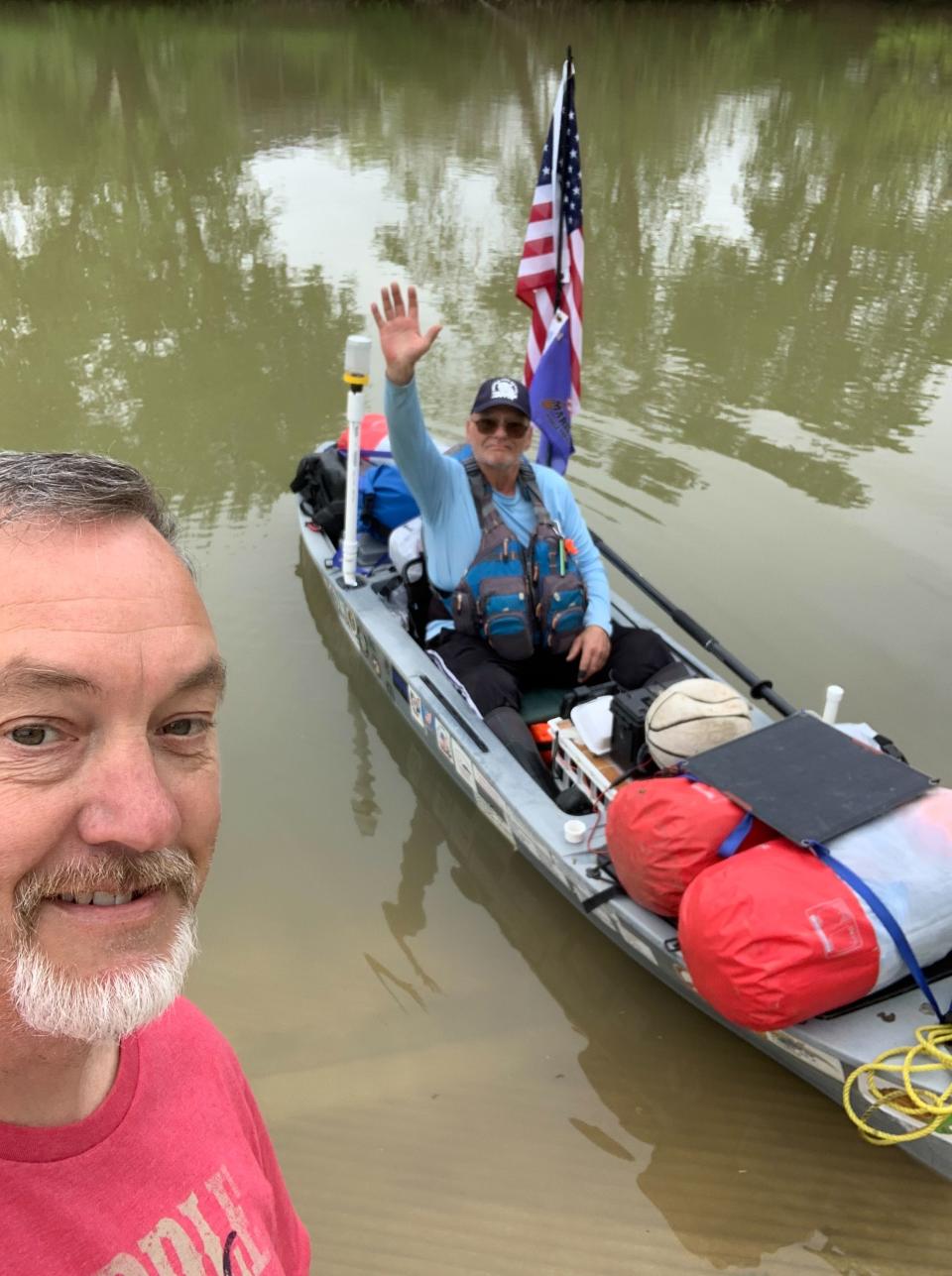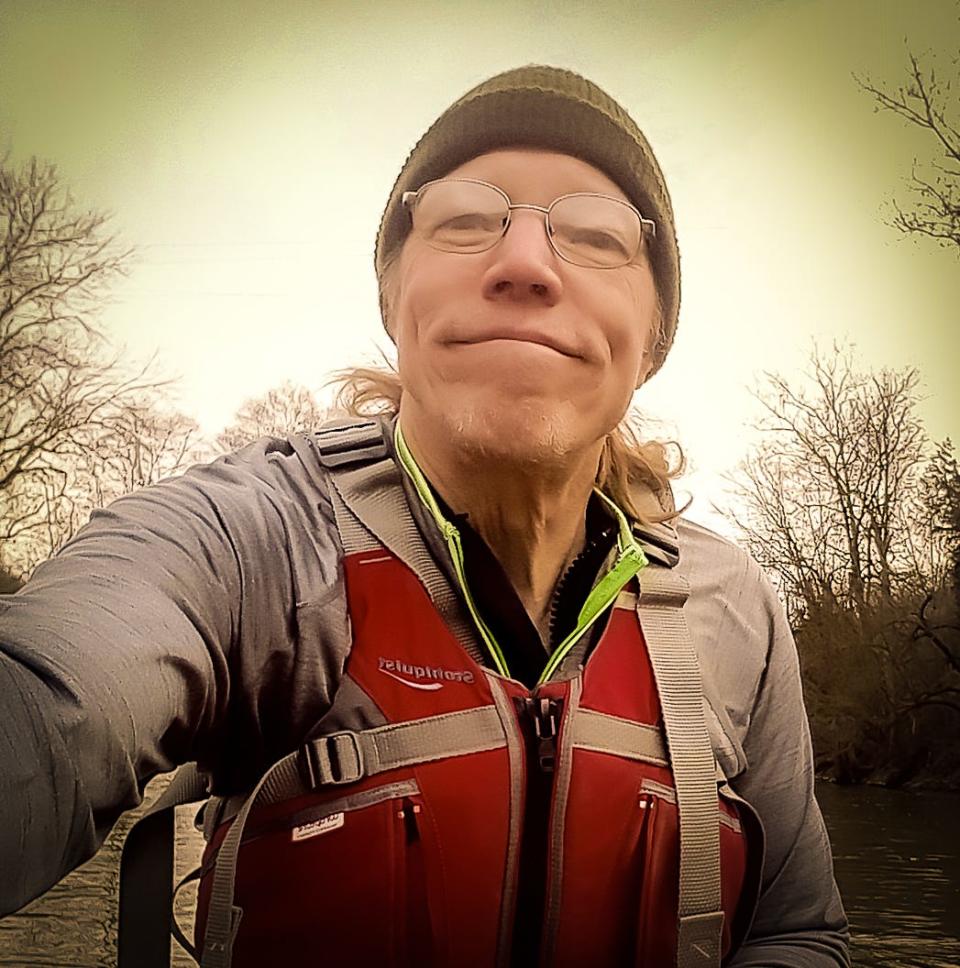Curtis Casto's Ohio River kayaking trip ends: Life’s about knowing when to say when

Some movies can be summed up in a few words.
For instance a fitting synopsis of “A River Runs Through It” might read, “Life sucks sometimes, but at least you can go fishing.”
You can also go kayaking. Case in point — Curtis Casto’s Ohio River trip.
After two weeks, paddling 300-plus miles, and constant setbacks, Curtis threw in the towel. He endured rainstorms, a leaking tent, turbulent currents, a barge traffic jam and, on the night of May 13, he was waylaid by a gut punch from giardia.
After a sleepless night at his campsite outside Huntington, W.Va., he hacked his way through a jungle of Japanese knotweed, an aggressive bamboo-like invasive plant, so the ambulance crew could find him to take him to St. Mary’s Medical Center.
You've got to admire a guy who knows when to call it quits
When I first met Curtis, the thing I admired most about him was his tenacity. After all, the guy had taken up kayaking, lost more than 100 pounds, overcame a litany of major health problems, and nearly drowned in an attempt to paddle on a group trip from Mount Vernon to Marietta. He sucked it up, trained some more, modified his boat, then made the trip alone.
Last week, as I drove down to Huntington to bring Curtis and his gear home, I realized there was something else I admired about him — he knew when to pack it in.

After he was released from the hospital, Curtis got a ride back to where he could bushwhack his way to his campsite. He packed his gear and paddled a couple of miles to the public landing at Harris Riverfront Park.
After a few days had passed, I asked him to share some observations and advice to anyone who might want to paddle big rivers. Here are a few excerpts from his responses.
“I cried for two miles paddling to the park,” he wrote in a text message. “I told myself, ‘Get it out. Get it done. You have much more to live for’.”
Still, after all that, Curtis said his biggest disappointment was not getting to meet Barry White. Curtis named his boat after the Vietnam War hero, who had offered to put him up when he got to Addison, Ky. White arranged for Curtis to stay at other places along the way on what was to have been a 980-mile journey. He also solicited donations from Kentucky veterans’ organizations for the Mount Vernon-based Paddle for Heroes. Curtis used the trip to raise funds for the organization, which helps improve the lives of military veterans and first responders through kayaking.
He plans to meet White this summer.
Advice from Curtis Casto: Regard river water as hazardous material
Curtis told me the high point of his trip was when Roger Miller met him at the river at Powhatan Point and took him to a laundromat. He described Miller as a “river angel” (like trail angels who help long-distance hikers). He knew of Miller through Paddle for Heroes.
“A guy I never met drives 10 miles, takes me to do laundry, pays for it, then takes me back to the river,” he said. “America is great!”
As for advice for those who might want to test the big waters, Curtis offers a few tips:
Don’t rely totally on satellite maps. “They do not tell you if the bank is made of sharp cut limestone or gravel. A satellite picture taken in the winter won’t show hundreds of logs floating inside a lock chamber.”
Regard river water as hazardous material. “Do not eat on the river. Stop, get out of the boat, wash your hands with hand sanitizer, then eat. Drink a lot but always sanitize the part of the water jug or bottle your hands or mouth will touch. Don’t trust the river water to drink no matter how you filter it. Plan when and where you will get your water and have backups just in case.”
Set a floating itinerary. Literally. “When reserving sites at campgrounds, hotels, etc., give them a range of dates you might show up. You never know whether you’ll be late, or early, or may have to stay a couple days instead of one.”
Don’t hug the banks and stay in the river channel as much as possible. “Get used to the waves from barges and get out there closer to them. When you see them coming, move over to the side then point the boat back at the wake at a 90-degree angle and paddle back into the channel.”
Curtis is done with huge dirty rivers. But he’ll be ready June 18 to tackle the Muskingum once again on a kayak trip from Mount Vernon to Marietta.
The tenacity of Curtis and kindred spirits reminds me of the relentless posse that dogged Butch Cassidy and the Sundance Kid. They make everyone shake their heads and ask, “Who ARE those guys?“
This article originally appeared on Ashland Times Gazette: Ohio kayaking trip brings life lesson: Know when to call it quits
